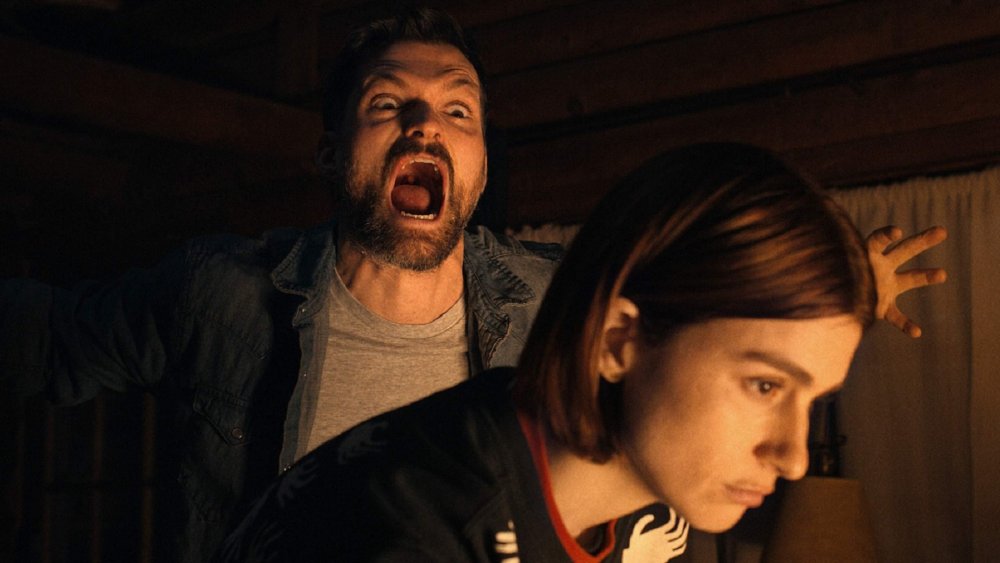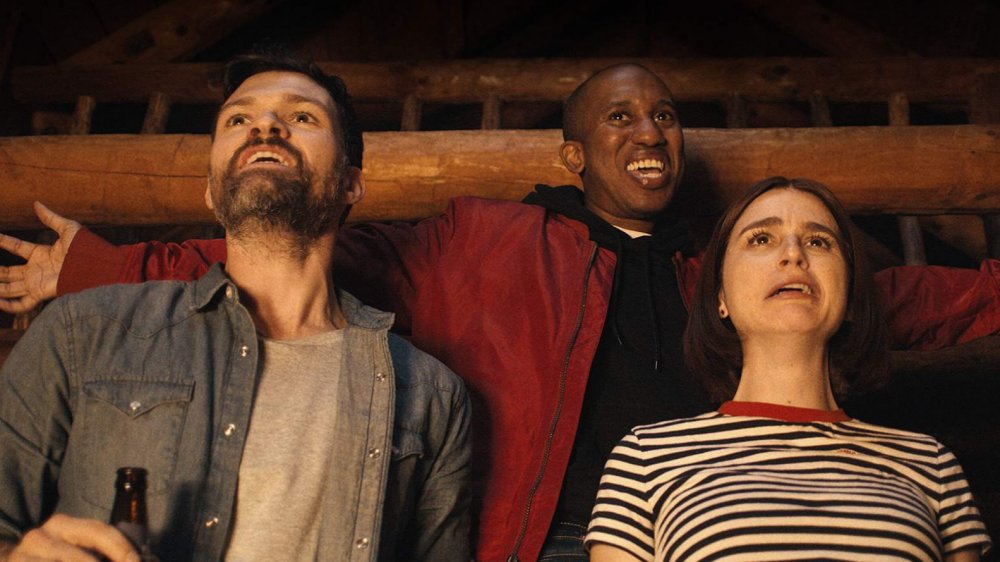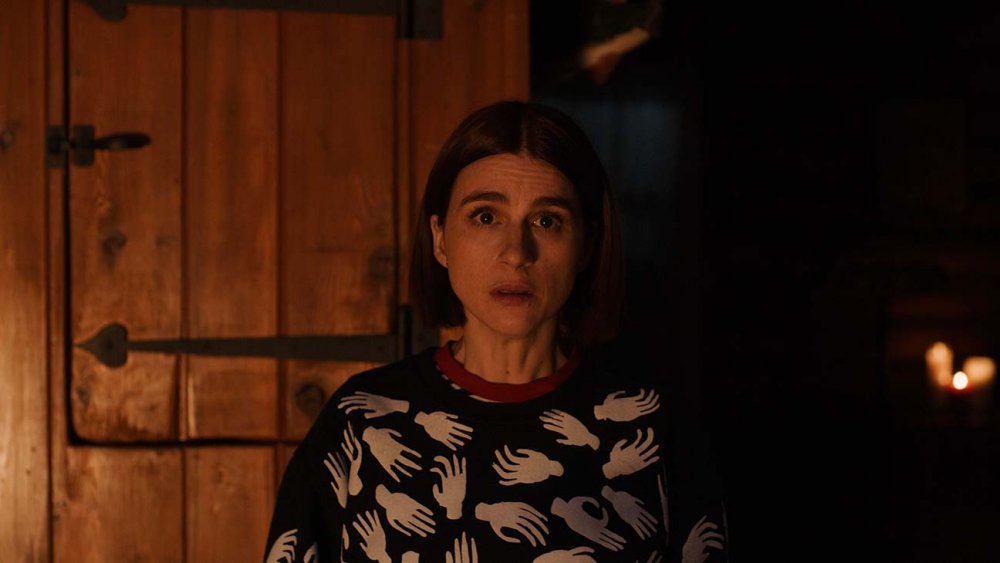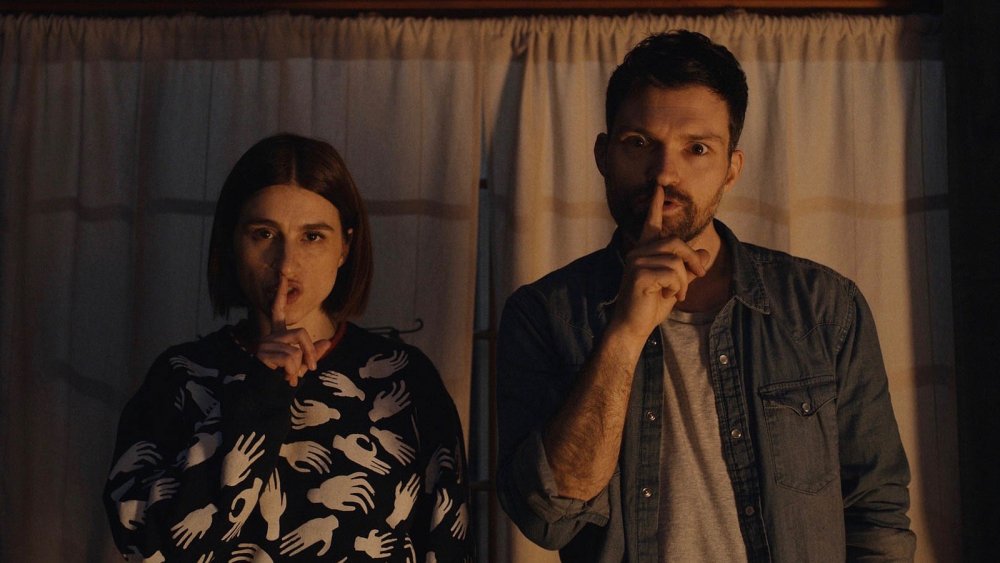The Ending Of Scare Me Explained
Contains spoilers for Scare Me
Sometimes the scariest stories are the ones where the monster is hiding in plain sight. In the new Shudder original movie Scare Me, viewers are told a handful of spooky tales after a storm leaves aspiring writer Fred (Josh Ruben, also the film's writer and director) and bestselling novelist Fanny (The Boys' Aya Cash) stuck in a mountain cabin without power and looking for something fun to pass the time. As the new acquaintances reveal more about their lives and beliefs through their storytelling game, a chilling tale unfolds that blurs the lines between the fantastical and the personal.
Through the very clever use of sound design and cinematography, Fred and Fanny's stories are able to build palpable tension, despite the fact that almost the entirety of the movie was filmed inside a cabin. Scare Me has the quality of an anthology horror film for most of its runtime, but during the final act, the themes that have been teased throughout the rest of the film come to bear. The ending successfully brings the terror into the realm of reality and hammers home the ideas behind the narrative with the force of a swinging fireplace poker.
Here are all the gruesome details of the ending of Scare Me explained.
A pizza delivery gets under Fred's skin and sparks a turn to the terrifying
For most of Scare Me, Fred and Fanny are the only two characters on screen. When they order a pizza, the affable and charismatic Carlo (Chris Redd) delivers it. At first, Carlo seems like he's just there to spice things up, serving as another storyteller, but his character also draws out some important contrasts between himself and Fred. Unlike Fred's occasional slips into prickly self-defensiveness, Carlo is good-natured, and Fanny takes a liking to him almost instantly. She doesn't pepper their conversations with criticisms and barbs the way she does with Fred.
This isn't lost on Fred, who we see becoming quiet and withdrawn as Fanny and Carlo enthusiastically collaborate on telling a story. Earlier in the film, when Fred took his turns at storytelling, Fanny was quick with pointed criticism of his style, mostly that he relies on cliches and lacks an attention to the types of detail that makes great writing great. But with Carlo, she appears to mostly be having fun. It doesn't hurt that Carlo is a massive fan of Fanny's hit zombie novel, Venus. He understands it as a work of art with depth and nuance, whereas Fred thinks of it as a clever bit of bestselling horror pulp not unlike the werewolf novel he went to the cabin to work on in the first place, the idea for which Fanny was highly critical of.
By the time Carlo leaves, Fred's attitude has clearly changed. While he was having moments of sullen introspection earlier in the movie, near the end, he appears to be almost despondent. After a break in the action, Fanny announces that she's going to call it a night. But before she can leave, Fred says he wants to tell one final story.
Fred's final story reflects his deep-rooted frustrations
Fred's final story is one that hits close to home. It's about a man who works hard but can't get ahead, and an ultra-successful woman who is "one of those lucky freaks that just has it easy." Fanny quickly realizes that Fred is describing the two of them. Throughout the movie, Fred makes allusions to his attempts to launch a career as a writer, director, and actor — and although he's initially awed at meeting a genuine success story in Fanny, he also exhibits intense flashes of bitterness.
Prior to this point in Scare Me, both Fanny and the viewers also learned a few other disturbing facts about Fred that seem more and more relevant — most notably that his ex-girlfriend has just taken a protection notice out against him. Eventually Fred drops the pretense and reveals that he has secretly read the notebook that Fanny has been making notes in all night — many of them unflattering observations about "wannabe writer Fred."
Fred asks Fanny why she's been taking notes about him, and she replies that, as a writer, it's her job to observe. Before that exchange, Fanny had expressed frustration about white male privilege multiple times throughout the movie, and when Fred confronts her about her note taking, she tells him, "You want my life? F***** just do the work, do the work, do the work!"
Fred doesn't seem to take in her criticism, and instead proposes a new game to Fanny. With a fireplace poker in hand he suggests, "How about I chase you? We could pretend we're in one of our stories. If I can't find you, I give you your notebook back. But if I do find you..."
Fanny faces a real-life monster in Fred
As Fred announces his final plan, Fanny is both terrified and conflicted. His tone continues to oscillate between jokey banter and serious threats. On one hand, the scary story game kicked off with Fanny declaring that she wanted Fred to scare her, and this might be his latest attempt to do just that. On the other, Fanny has been very attuned to Fred's tendency to slip into expressing extreme bitterness about her success.
Fred's turn is akin to an actualization of a quote commonly attributed to The Handmaid's Tale author Margaret Atwood: "Men are afraid that women will laugh at them. Women are afraid that men will kill them." Fanny decides to not take the chance that Fred might be joking and runs away from him.
Fred goes looking for Fanny, who successfully hides until she believes she has a moment to sneak out of the house. As soon as she comes out of hiding, Fred reappears and chases her down the stairs. Off screen, we hear a struggle happen, and then the clear sound of calamity. When the camera rejoins Fred and Fanny, it's Fred who has been mortally wounded with the fireplace poker sticking through his abdomen. Fanny is horrified. She appears to be still cycling back and forth between believing that Fred was serious in his intentions to kill her or that it was just a joke that went too far. Either way, the consequences of his action have now borne out in a horrifying way.
Fred asks Fanny to put him out of his misery, and although she agrees at first, she simply can't when it comes down to it. She flees the house, leaving Fred to slowly succumb to his injuries.
Bettina's triumphant return encapsulates Scare Me's most important message
After Fanny escapes the cabin, leaving a dying Fred and her ideas notebook behind, the film flashes forward to the next morning. This also marks the return of the forgotten fourth character of Scare Me: Bettina (Rebecca Drysdale), the overly chatty cab driver whom Fred rudely ignored (and failed to tip) at the beginning of the film. She's at the cabin to pick Fred up for his return trip, and stumbles onto his dead body when he doesn't answer the door.
Bettina also finds something else in the cabin before the credits start to roll: Fanny's notebook. In a mid-credits scene, we see that Bettina has used the ideas and observations in Fanny's notebook to write her own collection of stories, which seems to be a success. We already learned that, like Fred, Bettina has aspirations to be a writer. He dismissed her out of hand, but she clearly has the talent and drive to make possible what he could not.
Bettina coming out on top is a nice bow to wrap up the themes of the movie. Fred is ultimately destroyed by his own obsession with whether or not he's getting a fair shake compared to a woman who he feels is unfairly favored, when he should have simply been putting his head down and doing the work. Fanny tries to check him on this multiple times throughout Scare Me, and tells him that there's no secret to her success other than that she puts time and effort into her craft. But instead of listening, Fred internalizes her statements as criticism of him and lets them fester, ultimately leading to his death.
There are a handful of stories that come out during Scare Me, but Fred's pathological reaction to being confronted by a successful woman is ultimately the scariest.




